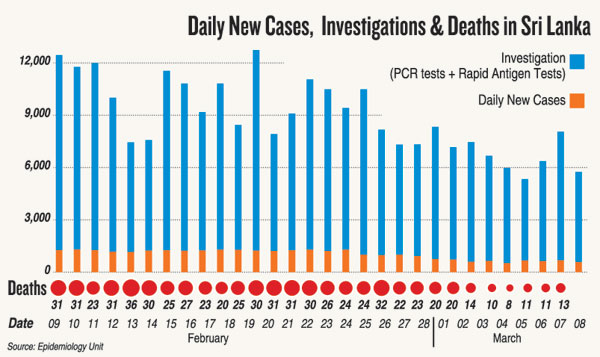News
Take the vaccine, don’t get complacent, we don’t know what lies around the corner: Expert

Dr. Rajiva de Silva
With the number of people interested in taking the vaccine against COVID-19 dropping, the Sunday Times asked Consultant Immunologist Dr. Rajiva de Silva of the Medical Research Institute (MRI) about concerns relating to food allergies and more.
Reiterating that it is crucial for all eligible people to take the vaccine (all 3 doses – 1st, 2nd and booster) to ward off severe disease, hospitalisation and death, he urges people not to get into a state of complacency, seemingly because the Omicron variant has not been as ruthless as Delta.
“We don’t know what lies around the corner, so we need to be prepared and armed with the right tools (vaccination) while resorting to hand hygiene, social distancing and avoiding closed and crowded places,” he says.
Next, this Immunologist looks at the concerns over allergies.
“There is no harm or danger to a person with a food allergy getting the vaccines,” he says looking at AstraZeneca, Pfizer and Sinopharm, the most commonly administered vaccines in Sri Lanka.
Vaccines against COVID-19 can be taken not only by those with food allergies but also those who get an allergic reaction after insect bites, says Dr. de Silva, pointing out that these are not ‘contraindications’ for the vaccine, which simply means that these are not situations for the vaccine not to be given.
He explains that if a person is allergic to polyethylene glycol (in a group of additives in medications, cosmetics and food), it would be good to check with a doctor before taking the vaccine. An allergy to polyethylene glycol is very rare.
“If, however, a person has a severe allergic reaction to multiple classes of antibiotics, a Specialist’s advice should be sought before taking an mRNA vaccine (Pfizer/Moderna),” he says, adding that another instance a person needs to be careful is if he/she has had an allergic reaction to a previous dose of the same vaccine.
Referring to the side-effects that people are complaining of and taking as an excuse not to get the jab, Dr. de Silva said when he asks them they say these side effects are fever, body aches and pains and a pain at the injection site. These are usual and get reversed in a few days, while there is also medication like paracetamol to reduce these side effects.
Dr. de Silva says that some indicate that “various people are saying various things and I’m scared to get the side effects”. He thinks that people were initially scared to get the vaccine and now believe that Omicron is like a cold, so the fear of death has disappeared from the horizon.
“Omicron may not be that bad. But what if there is a more dangerous variant in the near future. The antibody levels to block it generated by vaccines may have come down but the chances are that you will have T cells. The T cells boosted by the vaccines will remain,” he says.
He adds: “If you are vaccinated you will get mildly infected but the T cells will help keep the virus under control without rampaging through your system. If you have got a booster, you are protected against severe disease and death and probably against a potentially lethal strain in the future.”
He looks at the bigger picture and analyses thus: One is the side effects of the vaccine and the other is the COVID-19 infection. People think that Omicron is generally safe “like a cold”, but remember there are people who are dying of Omicron.
On vaccines and immunity generated by vaccines, Dr. de Silva says that all studies done across the world indicate that the longer the wait between the 1st and 2nd doses (anything between 4 to 12 weeks) would produce a better immune response. This was indicative when considering the Wuhan virus and the Alpha and Delta variants.

| Vaccines and reported side effects In a no-holds-barred interview, Consultant Immunologist Dr. Rajiva de Silva holds up all the concerns against vaccination to the light and gives scientific evidence collated across the world and ground-level investigations on reported severe side effects. Alleged cases of anaphylaxis after the Pfizer booster He says that quite a lot of patients with so-called anaphylaxis after vaccination have been investigated individually in Sri Lanka – “we have found that these people have had only fainting attacks and not anaphylaxis”. “This is called vasovagal syncope which comes about when you faint as your body overreacts to certain situations, such as the sight of blood or extreme emotional distress. It causes your heart rate and blood pressure to drop suddenly,” he says, explaining that they have done over 35 tests on serum levels on such people to confirm/discount anaphylaxis. All the indicators were negative for anaphylaxis. Eruption of hives after vaccination Dr. de Silva touches on instances where some people have got hives or urticaria – red, itchy welts, varying in size and appearance that result from a skin reaction – about fourhours after the vaccine dose. There could also be delayed hives, a day or two after the vaccine. This may happen but it is not serious. High fever, body aches and pains and malaise (lethargy) “This is basically part of the immune reaction. So when someone gets a very strong immune reaction, it indicates that the immune system is responding well and there is no cause for concern,” Dr. de Silva says. Blood clots after the 1st dose Recalling that there was a rare issue of blood clots with the 1st dose of AstraZeneca very early on, he stressed that it was not seen with the 2nd dose. The treatment too was not ideal then. Now scientists have found out the exact way it happened, the system has been formalized and deaths prevented. It is no longer a concern because now AstraZeneca is not being administered in the country. Myocarditis and pericarditis in children after Pfizer Dr. de Silva says that this occurred “very rarely” in males below 30 years of age, especially in the 16-20 age group, after the 2nd dose. In an overwhelming majority of these rare instances, it was mild, but no one knows exactly why this happened. Some people believe that it happened in Canada, the United States of America (USA) and the United Kingdom because when administering the vaccine, the syringe plunger is not withdrawn immediately. As such, the vaccine may enter blood vessels directly. However, in Sri Lanka and a few other countries, the plunger is withdrawn, he said, adding that Paediatricians have not recorded any cases of myocarditis among boys who have been given the 2nd dose. Meanwhile, they have found that when the interval between the first two doses is delayed from 4 weeks to 8-12 weeks, the incidence of myocarditis goes down. In Sri Lanka, the second dose for the over 16 age group is given three months after. Even if a boy suffers mild myocarditis, the prognosis is good as there is good management in Sri Lanka. However, everyone is advised not to engage in strenuous physical activity for 2 weeks after vaccination. Allegations of myocardial infarction (heart attacks), Quoting an article on myocardial infarction, stroke and pulmonary embolism after the Pfizer vaccine in people aged 75 years or older, published in the Journal of the American Medical Association (JAMA) on January 4, this year (2022), Dr. de Silva says the results were reported thus: In this nationwide study involving persons aged 75 years or older in France, no increase in the incidence of acute myocardial infarction, stroke and pulmonary embolism was detected 14 days following each vaccine dose.Israel and US studies reported that persons receiving the vaccine were not at increased risk of myocardial infarction, pulmonary embolism or cerebrovascular events (strokes) in the 42 days and 21 days following vaccination. According to Dr. de Silva, another study published in the New England Journal of Medicine (NEJM) on September 16, 2021 (last year) using data from the largest healthcare organization in Israel states: In this nationwide mass vaccination setting, the Pfizer vaccine was not associated with an elevated risk of most of the adverse events examined. The vaccinated and control groups had each included 884,828 people respectively.
| |
The best way to say that you found the home of your dreams is by finding it on Hitad.lk. We have listings for apartments for sale or rent in Sri Lanka, no matter what locale you're looking for! Whether you live in Colombo, Galle, Kandy, Matara, Jaffna and more - we've got them all!

